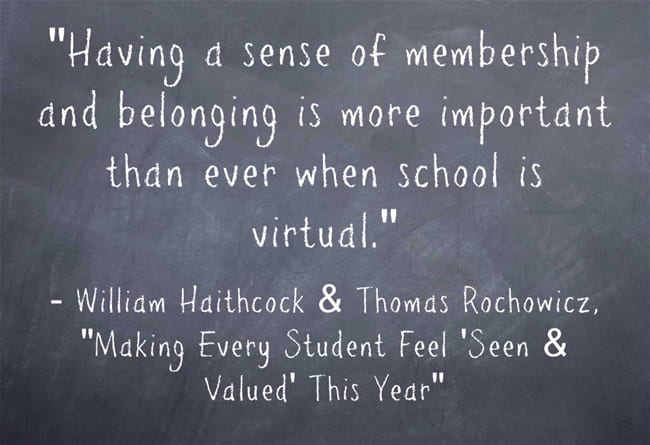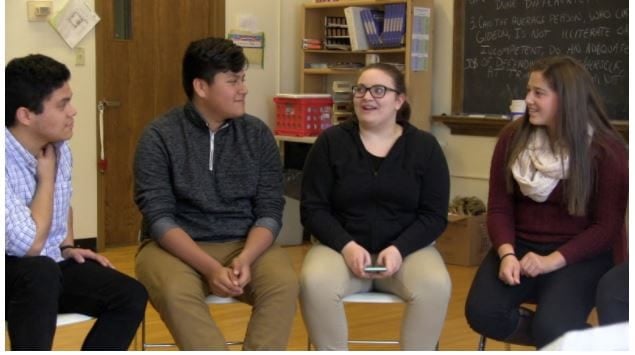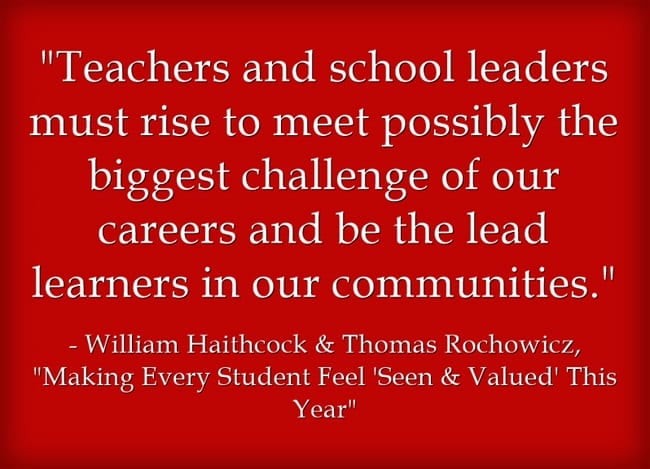Editor’s note: Because of a miscommunication, I received this post to late to include in my Ed Week series answering the question “What key lessons that you learned in the spring are you planning to bring to the new school year and what will they look like on a day-to-day basis?” But it’s an important post, and the authors agreed to let me post their response here.
William Haithcock is the principal of Harborside Academy and the recipient of EL Education’s Silverberg Leadership award in 2019.
Thomas Rochowicz is the principal and a former teacher at Washington Heights Expeditionary Learning School.
The spring of 2020 sent educators spiraling for responses to both the COVID-19 pandemic and the tragic killing of George Floyd that sparked protests across the country. Our safety and our overall human compassion were challenged like never before. At Harborside Academy, a 6-12 EL Education school in Kenosha, Wisconsin, and Washington Heights Expeditionary Learning School (WHEELS), a PreK-12 EL Education school in New York City, we learned valuable lessons that will impact how school will look on a day-to-day basis heading into the 2020-21 school year. As our school communities prepare for remote learning in the fall, we know we can do better by implementing our learning from the spring.
First and foremost, we learned the importance of staying committed to our core values. School life has gotten more complex, but our mission has not changed. At both of our schools, and across the EL Education network, we recognize that first and foremost our mission is to help our students get smart and contribute to building a better world. We do this by fostering students’ sense of belonging, purpose, and agency in our classrooms and in daily Crew meetings similar to what many schools call advisory or Morning Meeting. Crew allows teachers to create an engaging and meaningful space where students practice and reflect on social and emotional learning skills, connect deeply with their peers, and support each other to be successful socially and academically.
Caption: Before school went virtual, Harborside students circled up for Crew in their classrooms. Now they circle up daily on-line with the same small group of students and one Crew leader.
Photo Credit: EL Education
Having a sense of membership and belonging is more important than ever when school is virtual. It’s a little thing, but it really matters to take the time at the start of each class to welcome students at the door or as they join the room online, to celebrate their showing up, and to affirm the value of the work they are doing together. In the spring, we noted that virtual Crew engaged students when they couldn’t see each other in person, and grade-wide community meetings engaged some students who had not been consistently logging on. As a result, in the fall, both of our schools are planning weekly community meetings where the whole grade or several grades can join in a facilitated virtual meeting with the purpose of celebrating and affirming students as members of the school community.
We also believe it is important to recognize that virtual learning was hard for many of our students last fall. At Harborside, we are leveraging our strong relationships with our students by connecting specifically with students who struggled to succeed in the spring. Staff are contacting those students to review schedules and expectations, and supporting students with strategies they can use if they start to feel lost in the future. Organized study hall times, skill-building elective classes, after school homework help, and a student mentoring program are just a few of the structures that are being added this fall. At WHEELS, seeing that small-group remote sessions re-engaged students who had struggled, we are planning our blended and remote learning to prioritize small-group instruction and leverage the group work structures that had been a feature of most classes when we were in the building.
Another lesson we’ve learned as crises have piled on this year is that healing often begins with letting students lead and contribute to their communities. In the spring WHEELS English teacher Anthony Voulgarides asked his students to keep a pandemic journal, sharing their experiences and perspectives on what it was like to quarantine at home with infected family members or lose relatives who died from Covid 19. The journal assignment was therapeutic for many students and created an authentic learning experience that brought students together in the face of a common challenge. In the fall, our classes and extracurriculars will provide students more opportunities to contribute meaningfully to discussions of race, justice, and public health.
Through it all, despite the complexities of virtual learning, we really want our teachers to understand that deeper learning and the practical application of knowledge is still critically important. Worksheets are easy to e-mail home, but five assignments a week doing problems 1-40 is not going to expose our students to the varied depth of knowledge questions they need to develop new skills. Further, if we believe that education holds a share of the responsibility in building a more inclusive society, we need to focus on relevant, challenging instruction for all students.
At Harborside, teachers have met regularly this summer re-committing to compelling multidisciplinary units of study relating to the 1960’s civil rights movement, the flu pandemic of 1918, world conflicts, and Alzheimer’s/aging. Each of these units will end with the creation of significant student projects. Teachers are working to provide quality exemplars, clear learning targets, and task descriptors so that students can succeed with minimal face-to-face support.. Teachers are also carefully scaffolding each step of the assignments, and they are providing clear grading rubrics so that students understand what success should look like.
At WHEELS, we have also taken a depth-over-breadth approach, focusing on multidisciplinary learning expeditions where students can contribute to their community. Whether students are researching local organizations to provide microgrants with the Youth Philanthropy Initiative or advocating with local leaders to create a Clean Air Corridor around our building, engaging students in authentic tasks where they can take action increases their opportunities for deeper and more meaningful learning.
As the summer of 2020-21 school year begins, teachers and school leaders must rise to meet possibly the biggest challenge of our careers and be the lead learners in our communities. Our students need us to get this right! By sticking to our core values and innovating to address the instructional challenges of the moment, we can. For us this means ensuring that every student feels seen and valued, supporting students to overcome trauma and disconnection, providing opportunities for students to lead and contribute, and developing relevant and meaningful projects that engage students.






Recent Comments